VISUAL ETHNOGRAPHY, EXCERSIE FOR THE MIND AND HEART
Personal Interests
I traveled to London mainly because it was part of my student obligation and I was also interested in learning more about the Doctorate of Ministry in Leadership and Global perspectives. This was a crucial opportunity for my wife and me to discern whether we can committee to the program. We are eager to learn about the short and long term goal of the studies from the faculty and director’s vantage point of view. I was also interested in finding out how George Fox University structures the advances and what the impact of such undertaking might be for a student seeking an authentic global exposure of both an academic and practical nature.
I left for Heathrow airport from Portland and the plane arrived in London at eight o’clock in the morning. I had the option to take the express, taxi or the tube to Lancaster gate. I decided to ride of the famous underground train for the experience and besides it was the cheapest one of all the other choices.

I was also eager for the opportunity to meet all the members of LGP4 cohort in person. Upon finally meeting one another, I was impressed by the diversity, breadth of experience and knowledge my fellow cohort members brought to the advance. It felt like there was continuity during the face to face encounter and the ideas and thoughts we had expressed and shard together online, prior to the trip. LGP3’s arrival was an excellent experience since our cohort had the chance to interact with fellow students who had already been through a certain amount of course work.
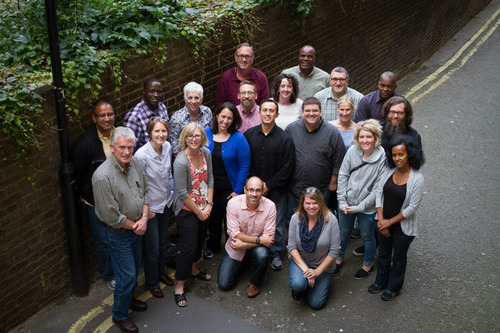
Not everyone in the photograph above is a student. Our professors and advisers where with us and were so helpful and humbly present. They blended in with the cohort members without losing their professional touch. The professors were so encouraging and I felt like they have our best interest both at heart and mind. I always want to know whether my instructors or higher ups are approachable and personable and I liked our professors. The next photograph is of Loren the director of the program making sure that we are all intact as a group in the bustle and hurtle of London.
The opportunity to visit London for the first time was another point of interest since I had not traveled to Great Britain before. I have always been fascinated with England since my childhood. Its history of the colonization of many countries around the world including Uganda, have heightened my seemingly never ending awareness of the England. I had always wondered how Great Britain’s imperialistic interests in Africa’s human resource, ivory, diamonds, copper and gold might have benefited its regions. The history of Anglican missionaries in Uganda is also a staple in the Ugandan formal education curriculum because of its legacy. Ward shows, “The Anglican Evangelical Church Missionary Society was the first Christian mission to enter Buganda, in 1877, at the invitation of Kabaka Muteesa I.”[1] “Kabaka” means king and so the fact that British missionaries where in contact with nobles, implies that missionaries also participated in the political realm of life in Uganda. A major political landmark associated with colonial residual ties between Uganda and England is the headquarters of one of the main political party called the “Uganda House”. The head of this political establishment was Uganda’s first Prime Minister Milton Obote to whom the British administration at the time handed over their power thus Uganda’s independence in 1962. The political party’s headquarters as seen in the photography below in London is called, the Uganda Peoples’. The original headquarters are in Kampala which the capital city of Uganda.
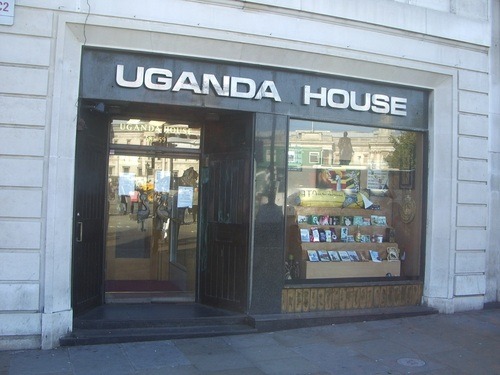
While in London, I took the time to learn as much as I could about the culture. I was inquisitive about the similarities and differences between the cultures in the United States. Right of the bat, I was captivated by the beauty of the city. The architecture in London compared to the one in most the major city in America is vastly different. It occurred to me that the building in most American cites represent modern and newer architectural styles.
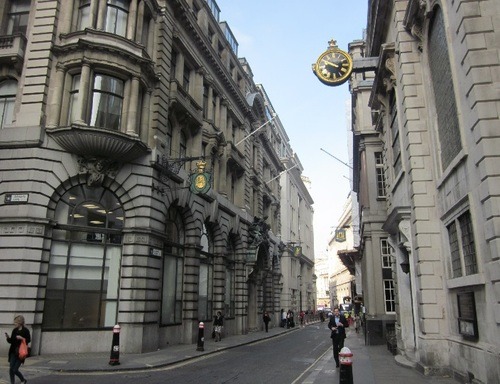
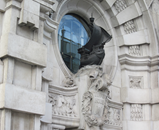
There was also the presence of the ongoing bloom of new architecture in London. There are the low rises buildings seem to characterize old London and one can also see the high rises that dominate the city’s skyline which represents the new. It was difficult for to conclude as to what style of construction portrays the city of London best even though it seemed a like perfect mixture of both the historical and current trend of buildings.
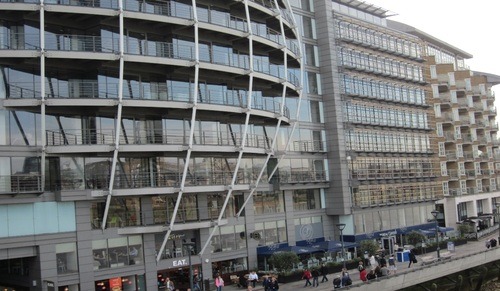
The other cultural fact that caught my attention was the ethnic diversity in London. I was taken aback by the different languages; I heard being spoken while on the tube. This was rather refreshing and remained on Uganda where one can experience people for different background with in a very short radius of each other. I also took to finding out how friendly people in London responded to strangers. I was told that the people culture in England was cold and unfriendly and I took it upon myself to know why. I randomly decided to talk to people in London and try to get to know them. Again to my surprise, everyone seems to be friendly, respectful and kind. In fact when I couldn’t find my directional bearings, people in London came to my aid. Now I am not under the illusion that my short experience in London should be everyone’s experience but I was thankfully impressed as one might tell from the happy smile of my friend I met while on an evening stroll in Hyde Park.
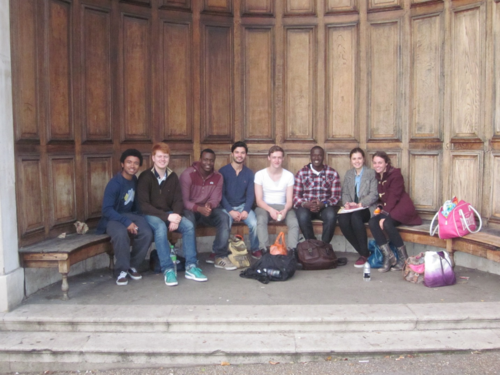
Since I had heard many stories about Europe’s historical position as the center of Christendom, I was excited to behold any land mark that represented such fact. I was also curious about the growth or decline of Christian if any and I was rather encouraged by the testimony from Reverend Jeremy about the life of the church in London. He shared with us that God was on move in the city despite the economic challenges people who work in the financial district had encountered.
Jeremy, seem hopeful about the surging growth of Christian in London because Christian leaders were becoming intentional about mounting an intellectual case for the gospel with the confidence that God has the last word. I was encouraged to know of the impact independent churches like Hillsong and other group seeking to make church palatable, were having on the youth in London. I purposed to attend a church service at Hillsong in London and I had a confirmatory experience and witness to Jeremy’s word.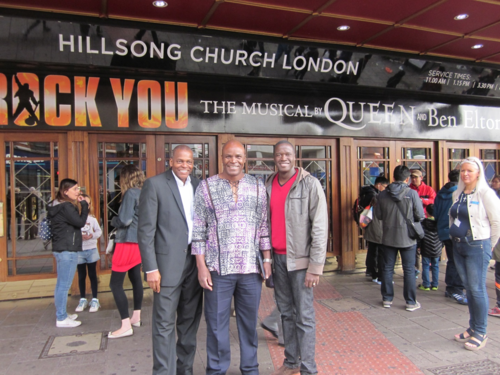
New Knowledge and Synthesis
Faculty had a rather hectic schedule for the doctor of ministry in Leadership and global perspective students. We had our orientation on the day of arrival, to class sessions from about eight thirty in the morning, to four thirty in the afternoon. The different visit we had to places like the Lloyds of London, St Paul Cathedral, Oasis church in Waterloo and St. Margaret Lothbury. Revered Jeremy was the person I appreciated the most because he introduced us to the joys and challenges of serving in London’s financial district. I learned anew and the different between pastoring a church and shepherding a parish. The latter is mission focused in the sense that ministers are positioned to interface with Christians and especially non-Christians.
I also appreciated the visiting Lloyds of London and learning about its history. It was astonishing to learn about how the multibillion dollar enterprise started its business undertakings from the humble beginnings of trading in tiny coffee shops. Lloyds’ unbeatable and resilient establishment also taught me about the hope and possibilities organizations might have for second chance of survival.
I was encouraged during one of the lectures where the guest speaker highlighted the need to affirm people in their everyday lives. Christians who have an increased confidence in the gospel ought to be ordinary people, doing ordinary things as unto God. The church gathered and scattered today should also focus on an increased confidence conviction in the church and an increased awareness of mission strategy. Mission belongs to everyone in their everyday front lines.
The opportunity to send ten day in London exposed me to a new place and knowledge. I understood more about the doctor of ministry in leadership and global perspective. A lot became clear about the nature of research and other course assignments. I enjoyed the various presentations from LGP3 which served to provide examples of what the professors might expect of LGP4.
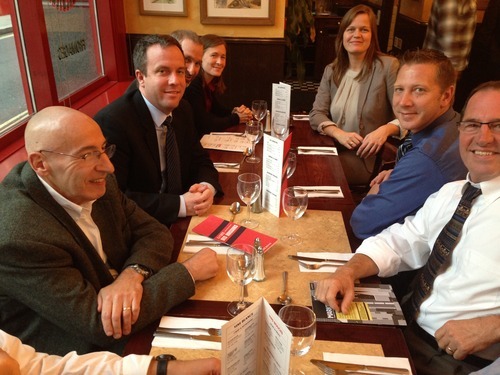
Practice and Application
Prior the advance, I was unsure about the use of social media namely Tumblr and the blog site. Since then I have been able to navigate my courses responsibilities with a degree of comfort. I understand the basic approach to writing a blog and I have used my blogging knowledge to contribute to other blogs as a guest writer. My time in London was most helpful in the area of school assignments. I gain to get a clear perspective of what the program was about and the necessary tip and skills to accomplish the tasks at hand. Andy’s tutorials on Turabian writing style were insightful since I had not used it after a few years being out of school. I also receive regular invitations as a guest preacher at a number of churches where I was able to use some of the material by incorporating it into my sermons. I am also involved in training and facilitating workshops on cultural adaptability on a frequent basis for a number of church mission groups and non-church based ones where I have been able to incorporate some of the material and knowledge I have gleaned from the study of social theory.
Synthesis and Methodogy
The course work we have undertaken since the program begun has been enlightening. Beginning with the advance in London, I have gained further appreciation for theology in it different shades. Admittedly, there are times when I intellectually perceive Christian theology but there are also instants when it seems like Christian theology is detached from present-day realities. On a continual basis, I have sought to understand how academic Christian theology integrates into the social domain beyond the classrooms of Bible Colleges, seminaries and institutionalized methods of organizing church; since not everyone who desires biblical studies will end up at a religious institution. Besides, I have always wondered how theology could be applied in such a way that it encourages people to ask leading question about Christianity and life in general. To that end, Genz and Olsen define theology as “faith seeking understanding”[2] which I found significantly applicable to human existence since humanity longs for hope and Christian theology is good news. Additionally, McGrath supports that claim by writing, “Theology is reflection upon the God whom Christians worship and adore.”[3]Our time in London was theological in many, but certainly through the nature of course work and the immersion experiences we had when we visited various houses of worship.
As I studied for all the assignments about Theology, it was energizing to realize how central it is to love God with all my mind, heart, soul and strength. I was also struck with the fact that resolute conviction about faith in Christ comes with being taught in God’s truth. This reality stuck out to because of the apparent changes people face from moving house, changes of jobs, loss of family members and various religious experiences. In my walk with God, I have noticed times and seasons where I question a lot things about my faith, life and social responsibilities. Studying about social theory, was helpful because I got to learn more about the principles and forces at work in a person’s faith and life. Elliot’s description and application of Natalie’s life to the science of social theory turned out to be insightful. Furthermore, Elliot reveals “Like Natalie, most people- of the time – possess a basic social theory, which they use to orientate themselves to others and the wider world”[4]
To that end, I have been able to adapt my awareness to the fact the people bring particular thought units to society and I now understand that people’s thought patterns impact how they view life. This has implications form visual ethnography as well. The call for the need for sensitivity is valid when capturing images in any given context. It is clear to me that Pink also advocates for the same mindfulness and emphasizes the need for the formation of partnerships between researcher and informant in order to stay close to reality, culture and contextual experience. Pink notes:
Moreover, a linear visual chronology may not consistently represent the way in which reality was experienced or conceptualized by all the individuals involved. Narratives and sequences are not necessarily fixed. The order in which events and activities are experience may change, and the orders in which they are remembered and spoken about may differ from the chronological order in which they happened.[5]
I also greatly appreciated Pink’s insight and emphasis reflexivity which in my opinion is connected to on human flourishing and love correct respect for self and love for neighbor. The notion that an ethnography research needs to seek the permission of participants is a strong attribute to the positive concern for people’s dignity and livelihood. However, in order for people to be continuously cognizant of other people’s cultural setting and society around them, it is important for people to practice the art and discipline of critical thinking. During the semester, it continually occurred to me that critical thinking was an important aspect of respectful and discerning communication. The ability to reflect on one’s thoughts and strategies points him or her to respectfully approach society issues with preparedness. Not only that, but an inquirer can become a good listener and practitioner in any given community.
This semester has been an action pack experience. I have felt like my life was full and still the demands of life kept on coming. I am glad that I have persisted and endured through it all, since that is starting and finishing is part and parcel of leadership. Leadership is also about taking responsible and most of the time, I have needed to employ the strategy of one step at a time. Over all, I am grateful for the rigorous times of learning, thinking and the opportunity to participle most of the theories we have been discussing. Working at a cohort has been a source of encouragement because I have been reminded that I am on this journey with friends who are supportive and understand what it is like to be a doctoral student.
[1] Kevin, Ward. Eating and Sharing: Church and State in Uganda. Journal Of Anglican Studies 3, no. 1 (June 2005): 99-119. Academic Search Premier, EBSCOhost (accessed November 26, 2013).
[2] Stanley Grenz, Roger E. Olsen, Who Needs Theology: An Invitation to the Study of God (Downers Grove, IL: IVP, 1996), 16.
[3] Alister E. McGrath, Christian Theology: An Introduction (Blackwell: London, 1994),117.
[4] Anthony Elliott, Contemporary Social Theory: An Introduction (New York: Rutledge, 2009), 574-676. Kindle.
[5] Sarah Pink, Doing Visual Ethnography. Second Edition (SAGE Publications Ltd., Thousand Oaks,California, 2007), 106.
Leave a Reply
You must be logged in to post a comment.